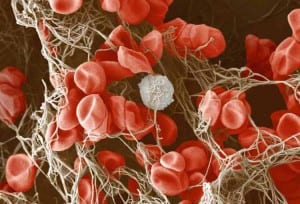 A new study, published in April 2015 in the journal Primary Health Care Research and Development, entitled ‘Comparison of coronary heart disease genetic assessment with conventional cardiovascular risk assessment in primary care: reflections on a feasibility study‘ was led by Prof Nadeem Qureshi of the University of Nottingham and included CaHRU researcher Dr Jo Middlemass as a co-author. The study assessed the feasibility of collecting genetic samples and the changes in self-reported outcomes after cardiovascular risk assessment (conventional and genetic), particularly lifestyle changes or anxiety.
A new study, published in April 2015 in the journal Primary Health Care Research and Development, entitled ‘Comparison of coronary heart disease genetic assessment with conventional cardiovascular risk assessment in primary care: reflections on a feasibility study‘ was led by Prof Nadeem Qureshi of the University of Nottingham and included CaHRU researcher Dr Jo Middlemass as a co-author. The study assessed the feasibility of collecting genetic samples and the changes in self-reported outcomes after cardiovascular risk assessment (conventional and genetic), particularly lifestyle changes or anxiety.
 As part of Government Guidelines, general practitioners (GPs) routinely offer their patients an assessment to assess their risk of getting heart disease over the next ten years. These conventional cardiovascular risk assessments capture environmental risk factors and gene-environment including family history of premature heart disease. However, there are also genetic tests assessing genetic predisposition. Commercial direct-to-consumer CHD genetic tests are being actively marketed, and patients, particularly those with a perceived strong family history, may opt to access these services without prior consultation with their health providers. What is not known is the level of discrepancy between the results of conventional and genetic tests and also what, if any, lifestyle changes patients will make as a consequence of having the genetic test.
As part of Government Guidelines, general practitioners (GPs) routinely offer their patients an assessment to assess their risk of getting heart disease over the next ten years. These conventional cardiovascular risk assessments capture environmental risk factors and gene-environment including family history of premature heart disease. However, there are also genetic tests assessing genetic predisposition. Commercial direct-to-consumer CHD genetic tests are being actively marketed, and patients, particularly those with a perceived strong family history, may opt to access these services without prior consultation with their health providers. What is not known is the level of discrepancy between the results of conventional and genetic tests and also what, if any, lifestyle changes patients will make as a consequence of having the genetic test.
 In an observational feasibility study in ten British general practices in Central England, 320 individuals, who had completed conventional cardiovascular risk assessment, were offered CHD genetic test, with follow-up outcome questionnaire at 8 months for lifestyle changes and anxiety. Over a third of individuals offered genetic testing in primary care, as part of an enhanced CVD risk assessment, took up the offer and returned genetic test specimens, with over a third reporting family history of CHD in a specified relative. This study found that most participants (82%) classified at above-average risk on conventional CVD risk assessment in primary care were classified at only average risk using genetic-based assessment. In contrast, fewer participants (39%) at above-average risk on genetic assessment were classified as average risk on conventional CVD risk assessment.
In an observational feasibility study in ten British general practices in Central England, 320 individuals, who had completed conventional cardiovascular risk assessment, were offered CHD genetic test, with follow-up outcome questionnaire at 8 months for lifestyle changes and anxiety. Over a third of individuals offered genetic testing in primary care, as part of an enhanced CVD risk assessment, took up the offer and returned genetic test specimens, with over a third reporting family history of CHD in a specified relative. This study found that most participants (82%) classified at above-average risk on conventional CVD risk assessment in primary care were classified at only average risk using genetic-based assessment. In contrast, fewer participants (39%) at above-average risk on genetic assessment were classified as average risk on conventional CVD risk assessment.
Study participation was not associated with increased anxiety between baseline and follow-up or between participants at average and above-average risk based on genetic assessment. Considering lifestyle change from baseline to eight month follow-up among participants reporting at both time points, the proportion in the action/maintenance phase of change increased by 13% (from 54 to 61) for diet, 2% (from 51 to 52) for exercise, and decreased by 3% (from 35 to 34) for smokers.
 This feasibility study had limited ability to demonstrate the relationship between change in anxiety and lifestyle risk-reducing behaviour with genetic risk identification. This may be explained by the CHD genetic test following the conventional assessment because there may have already been some lifestyle change due to the previous cardiovascular risk assessment undertaken prior to the genetic test. The current research suggests GPs will face the challenge of patients presenting with direct-to-consumer genetic results that are inconsistent with conventional cardiovascular risk assessment, suggesting that GPs and practice nurses should explore patients’ rationale for undertaking genetic test-based risk assessment and their perceptions of family history and conventional risk assessment.
This feasibility study had limited ability to demonstrate the relationship between change in anxiety and lifestyle risk-reducing behaviour with genetic risk identification. This may be explained by the CHD genetic test following the conventional assessment because there may have already been some lifestyle change due to the previous cardiovascular risk assessment undertaken prior to the genetic test. The current research suggests GPs will face the challenge of patients presenting with direct-to-consumer genetic results that are inconsistent with conventional cardiovascular risk assessment, suggesting that GPs and practice nurses should explore patients’ rationale for undertaking genetic test-based risk assessment and their perceptions of family history and conventional risk assessment.
Dr Jo Middlemass
